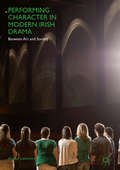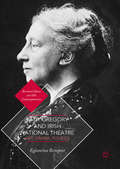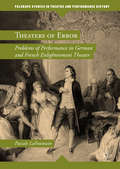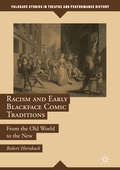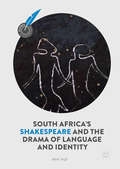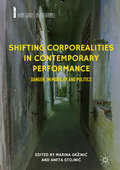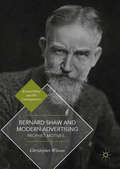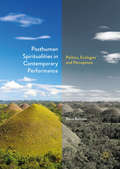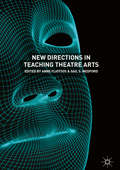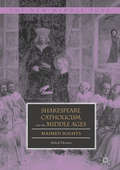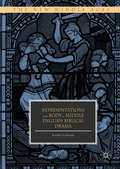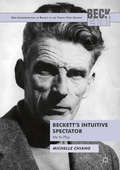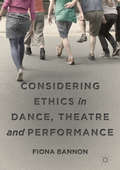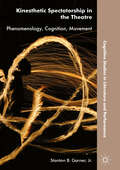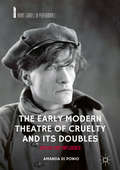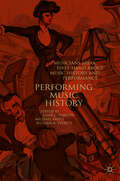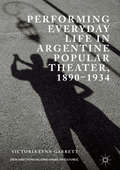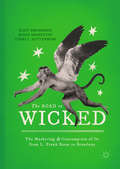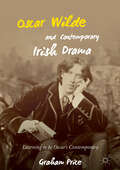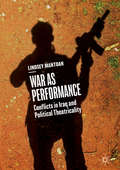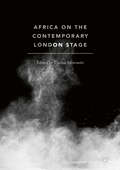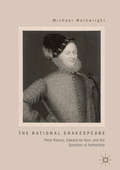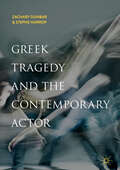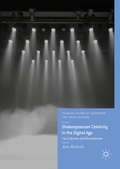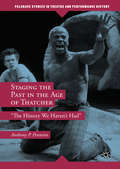- Table View
- List View
Performing Character in Modern Irish Drama: Between Art And Society
by Michał LachmanThis book is about the history of character in modern Irish drama. It traces the changing fortunes of the human self in a variety of major Irish plays across the twentieth century and the beginning of the new millennium. Through the analysis of dramatic protagonists created by such authors as Yeats, Synge, O’Casey, Friel and Murphy, and McGuinness and Walsh, it tracks the development of aesthetic and literary styles from modernism to more recent phenomena, from Celtic Revival to Celtic Tiger, and after.The human character is seen as a testing ground and battlefield for new ideas, for social philosophies, and for literary conventions through which each historical epoch has attempted to express its specific cultural and literary identity. In this context, Irish drama appears to be both part of the European literary tradition, engaging with its most contentious issues, and a field of resistance to some conventions from continental centres of avant-garde experimentation. Simultaneously, it follows artistic fashions and redefines them in its critical contribution to European artistic and theatrical diversity.
Lady Gregory and Irish National Theatre: Art, Drama, Politics (Bernard Shaw And His Contemporaries Ser.)
by Eglantina RemportThis book is the first comprehensive critical assessment of the aesthetic and social ideals of Lady Augusta Gregory, founder, patron, director, and dramatist of the Abbey Theatre in Dublin. It elaborates on her distinctive vision of the social role of a National Theatre in Ireland, especially in relation to the various reform movements of her age: the Pre-Raphaelite Movement, the Co-operative Movement, and the Home Industries Movement. It illustrates the impact of John Ruskin on the aesthetic and social ideals of Lady Gregory and her circle that included Horace Plunkett, George Russell, John Millington Synge, William Butler Yeats, and George Bernard Shaw. All of these friends visited the celebrated Gregory residence of Coole Park in Country Galway, most famously Yeats. The study thus provides a pioneering evaluation of Ruskin’s immense influence on artistic, social, and political discourse in Ireland in the late nineteenth and early twentieth century.
Theaters of Error: Problems Of Performance In German And French Enlightenment Theater (Palgrave Studies In Theatre And Performance History Ser.)
by Pascale LaFountainThis book offers provocative readings of canonical Enlightenment dramas that reflect and shape the period’s changing understanding of error. With striking interdisciplinary connections to theater treatises as well as works from the philosophical, legal, and medical discourses, it tracks the relocation of error from the moral to the physical realm, a movement that begins with Lessing and continues through the turn of the nineteenth century.Featuring detailed analyses of Lessing’s Miß Sara Sampson, Diderot’s Le Fils naturel, Schiller’s Die Räuber, and Kleist’s Die Familie Schroffenstein alongside rich close readings of diverse primary sources, ranging from previously untranslated acting treatises by Sainte-Albine and Engel to texts from the German Archiv des Criminalrechts, this study introduces the reader to new Enlightenment sources and compellingly concludes that ultimately it is no longer evil, but rather bodily irregularities and mistakes in reading the body that become the driving principle of Enlightenment drama.
Racism and Early Blackface Comic Traditions: From the Old World to the New (Palgrave Studies in Theatre and Performance History)
by Robert HornbackThis book traces blackface types from ancient masks of grinning Africans and phallus-bearing Roman fools through to comedic medieval devils, the pan-European black-masked Titivillus and Harlequin, and racial impersonation via stereotypical 'black speech' explored in the Renaissance by Lope de Vega and Shakespeare. Jim Crow and antebellum minstrelsy recycled Old World blackface stereotypes of irrationality, ignorance, pride, and immorality. Drawing upon biblical interpretations and philosophy, comic types from moral allegory originated supposedly modern racial stereotypes. Early blackface traditions thus spread damning race-belief that black people were less rational, hence less moral and less human. Such notions furthered the global Renaissance’s intertwined Atlantic slave and sugar trades and early nationalist movements. The latter featured overlapping definitions of race and nation, as well as of purity of blood, language, and religion in opposition to 'Strangers'. Ultimately, Old World beliefs still animate supposed 'biological racism' and so-called 'white nationalism' in the age of Trump.
South Africa's Shakespeare and the Drama of Language and Identity (Global Shakespeares)
by Adele SeeffThis volume considers the linguistic complexities associated with Shakespeare’s presence in South Africa from 1801 to early twentieth-first century televisual updatings of the texts as a means of exploring individual and collective forms of identity. A case study approach demonstrates how Shakespeare’s texts are available for ideologically driven linguistic programs. Seeff introduces the African Theatre, Cape Town, in 1801, multilingual site of the first recorded performance of a Shakespeare play in Southern Africa where rival, amateur theatrical groups performed in turn, in English, Dutch, German, and French. Chapter 3 offers three vectors of a broadening Shakespeare diaspora in English, Afrikaans, and Setswana in the second half of the nineteenth century. Chapter 4 analyses André Brink’s Kinkels innie Kabel, a transposition of Shakespeare’s The Comedy of Errors into Kaaps, as a radical critique of apartheid’s obsession with linguistic and ethnic purity. Chapter 5 investigates John Kani’s performance of Othello as a Xhosa warrior chief with access to the ancient tradition of Xhosa storytellers. Shakespeare in Mzansi, a televisual miniseries uses black actors, vernacular languages, and local settings to Africanize Macbeth and reclaim a cross-cultural, multilingualism. An Afterword assesses the future of Shakespeare in a post-rainbow, decolonizing South Africa. Global Sha Any reader interested in Shakespeare Studies, global Shakespeare, Shakespeare in performance, Shakespeare and appropriation, Shakespeare and language, Literacy Studies, race, and South African cultural history will be drawn to this book.
Shifting Corporealities in Contemporary Performance: Danger, Im/mobility And Politics (Avant-gardes In Performance)
by Aneta Stojnić Marina GržinićThis book investigates how contemporary artistic practices engage with the body and its intersection with political, technological, and ethical issues. Departing from the relationship between corporeality and performing arts (such as theater, dance, and performance), it turns to a pluriversal understanding of embodiment that resides in the extra violent conditions of contemporary global necro-capitalism in order to conduct a thorough analysis that goes beyond arts and culture. It brings together theoretical academic texts by established and emerging scholars alike, exposing perspectives form different fields (philosophy, cultural studies, performance studies, theater studies, and dance studies) as well as from different geopolitical contexts. Through a series of thematic clusters, the study explores the reactivation of the body as a site of a new meaning-making politics.
Bernard Shaw and Modern Advertising: Prophet Motives (Bernard Shaw and His Contemporaries)
by Christopher WixsonThis book charts how promotional campaigns in which Bernard Shaw participated were key crucibles within which agency and personality could re-negotiate their relationship to one another and to the consuming public. Concurrent with the rise of modern advertising, the creation of Shaw’s 'G.B.S.' public persona was achieved through masterful imitation of patent medicine marketing strategies and a shrewd understanding of the relationship between product and spokesman. Helping to enhance the visibility of his literary writing and dovetailing with his Fabian political activities, 'G.B.S.' also became a key figure in the evolution of testimonial endorsement and the professionalizing of modern advertising. The study analyzes multiple ad series in which Shaw was prominently featured that were occasions for self-promotion for both Shaw and the agencies, and presage the iconoclastic style of contemporary 'public personality' and techniques of celebrity marketing.
Posthuman Spiritualities in Contemporary Performance: Politics, Ecologies and Perceptions
by Silvia BattistaThis book provides an interpretative analysis of the notion of spirituality through the lens of contemporary performance and posthuman theories. The book examines five performance/artworks: The Artist is Present (2010) by Marina Abramović; The Deer Shelter Skyscape (2007) by James Turrell; CAT (1998) by Ansuman Biswas; Journey to the Lower World by Marcus Coates (2004); and the work with pollen by Wolfgang Laib. Through the analysis of these works the notion of spirituality is grounded in materiality and embodiment allowing the conceptual juxtaposition of spirit and matter to introduce the paradoxical as the guiding thread of the narrative of the book. Here, the human is interrogated and negotiated with/within a plurality of other living organisms, intangible existences and micro and macrocosmic ecologies. Silence, meditation, shamanic journeys, reciprocal gazing, restraint, and contemplation are analyzed as technologies used to manipulate perception and adventure into the multilayered condition of matter.
New Directions in Teaching Theatre Arts
by Anne Fliotsos Gail S. MedfordThis book reflects the changes in technology and educational trends (cross-disciplinary learning, entrepreneurship, first-year learning programs, critical writing requirements, course assessment, among others) that have pushed theatre educators to innovate, question, and experiment with new teaching strategies. The text focuses upon a firm practice-based approach that also reflects research in the field, offering innovative and proven methods that theatre educators may use to actively engage students and encourage student success. The sixteen essays in this volume are divided into five sections: Teaching with Digital Technology, Teaching in Response to Educational Trends, Teaching New Directions in Performance, Teaching Beyond the Traditional, and Teaching Collaboratively or Across Disciplines. Study of this book will provoke readers to question both teaching methods and curricula as they consider the ever-shifting arts landscape and the potential careers for theatre graduates.
Shakespeare, Catholicism, and the Middle Ages: Maimed Rights (The New Middle Ages)
by Alfred ThomasWhereas traditional scholarship assumed that William Shakespeare used the medieval past as a negative foil to legitimate the present, Shakespeare, Catholicism, and the Middle Ages offers a revisionist perspective, arguing that the playwright valorizes the Middle Ages in order to critique the oppressive nature of the Tudor-Stuart state. In examining Shakespeare’s Richard II, The Merchant of Venice, Hamlet, King Lear, Macbeth, and The Winter’s Tale, the text explores how Shakespeare repossessed the medieval past to articulate political and religious dissent. By comparing these and other plays by Shakespeare’s contemporaries with their medieval analogues, Alfred Thomas argues that Shakespeare was an ecumenical writer concerned with promoting tolerance in a highly intolerant and partisan age.
Representations of the Body in Middle English Biblical Drama (The New Middle Ages)
by Estella CiobanuRepresentations of the Body in Middle English Biblical Drama combines epistemological enquiry, gender theory and Foucauldian concepts to investigate the body as a useful site for studying power, knowledge and truth. Intertwining the conceptualizations of violence and the performativity of gender identity and roles, Estella Ciobanu argues that studying violence in drama affords insights into the cultural and social aspects of the later Middle Ages. The text investigates these biblical plays through the perspective of the devil and offers a unique lens that exposes medieval disquiets about Christian teachings and the discourse of power. Through detailed primary source analysis and multidisciplinary scholarship, Ciobanu constructs a text that interrogates the significance of performance far beyond the stage.
Beckett's Intuitive Spectator: Me to Play (New Interpretations of Beckett in the Twenty-First Century)
by Michelle ChiangBeckett’s Intuitive Spectator: Me to Play investigates how audience discomfort, instead of a side effect of a Beckett pedagogy, is a key spectatorial experience which arises from an everyman intuition of loss. With reference to selected works by Henri Bergson, Immanuel Kant and Gilles Deleuze, this book charts the processes of how an audience member’s habitual way of understanding could be frustrated by Beckett’s film, radio, stage and television plays. Michelle Chiang explores the ways in which Beckett exploited these mediums to reconstitute an audience response derived from intuition.
Considering Ethics in Dance, Theatre and Performance
by Fiona BannonThis book asks important questions about making performance through the means of collaboration and co-created practice. It argues that we can align ethics and aesthetics with collaborative performance to realise the importance of being in association with one another, and being engaged through our shared imaginations. Evident in the examples of practice visited in this study is the attention given by a number of practitioners to the development of shared, co-operative modes of creation. Here, we can appreciate ethical work as being relational, forged in association with the others as we cultivate ideas that matter.In looking at a range of work from practitioners including Meg Stuart, Rosemary Lee, Deufert&Philschke and Fevered Sleep, Considering Ethics in Dance, Theatre and Performance explores ways that we rehearse by attending to ethics, aesthetics and co-creation. In learning to listen, to observe, to co-operate and to negotiate, these practitioners reveal the ways that they bring their work into existence through the transmission of shared meaning.
Kinesthetic Spectatorship in the Theatre: Phenomenology, Cognition, Movement (Cognitive Studies in Literature and Performance)
by Stanton B. Garner Jr.This book is about the centrality of movement, movement perception, and kinesthetic experience to theatrical spectatorship. Drawing upon phenomenological accounts of movement experience and the insights of cognitive science, neuroscience, acting theory, dance theory, philosophy of mind, and linguistics, it considers how we inhabit the movements of others and how these movements inhabit us. Individual chapters explore the dynamics of movement and animation, action and intentionality, kinesthetic resonance (or mirroring), language, speech, and empathy. In one of its most important contributions to the study of theatre, performance, and spectatorship, this book foregrounds otherness, divergence, and disability in its account of movement perception. The discussions of this and other issues are accompanied by detailed analysis of theatre, puppetry, and dance performances.
The Early Modern Theatre of Cruelty and its Doubles: Artaud and Influence (Avant-Gardes in Performance)
by Amanda Di PonioThis book examines the influence of the early modern period on Antonin Artaud’s seminal work The Theatre and Its Double, arguing that Elizabethan and Jacobean drama and their early modern context are an integral part of the Theatre of Cruelty and essential to its very understanding. The chapters draw links between the early modern theatrical obsession with plague and regeneration, and how it is mirrored in Artaud’s concept of cruelty in the theatre. As a discussion of the influence of Shakespeare and his contemporaries on Artaud, and the reciprocal influence of Artaud on contemporary interpretations of early modern drama, this book is an original addition to both the fields of early modern theatre studies and modern drama.
Performing Music History: Musicians Speak First-Hand about Music History and Performance
by John C. Tibbetts Michael Saffle William A. EverettPerforming Music History offers a unique perspective on music history and performance through a series of conversations with women and men intimately associated with music performance, history, and practice: the musicians themselves. Fifty-five celebrated artists—singers, pianists, violinists, cellists, flutists, horn players, oboists, composers, conductors, and jazz greats—provide interviews that encompass most of Western music history, from the Middle Ages to contemporary classical music, avant-garde innovations, and Broadway musicals. The book covers music history through lenses that include “authentic” performance, original instrumentation, and social context. Moreover, the musicians interviewed all bring to bear upon their respective subjects three outstanding qualities: 1) their high esteem in the music world as immediately recognizable names among musicians and public alike; 2) their energy and devotion to scholarship and the recovery of endangered musical heritages; and 3) their considerable skills, media savvy, and showmanship as communicators. Introductory essays to each chapter provide brief synopses of historical eras and topics. Combining careful scholarship and lively conversation, Performing Music History explores historical contexts for a host of fascinating issues.
Performing Everyday Life in Argentine Popular Theater, 1890–1934 (New Directions In Latino American Cultures Ser.)
by Victoria Lynn GarrettThis book examines the prolific and widely-attended popular theater boom of the género chico criollo in the context of Argentina’s modernization. Victoria Lynn Garrett examines how selected plays mediated the impact of economic liberalism, technological changes, new competing and contradictory gender roles, intense labor union activity, and the foreign/nativist dichotomy. Popular theaters served as spaces for cultural agency by portraying conventional and innovative performances of daily life. This dramatic corpus was a critical mass cultural medium that allowed audiences to evaluate the dominant fictions of liberal modernity, to critique Argentina’s purportedly democratic culture, and to imagine alternative performances of everyday life in accordance with their realities. Through a fresh look at the relationship among politics, economics, popular culture, and performance in Argentina’s modernization period, the book uncovers largely overlooked articulations of popular-class identities and desires for greater inclusion that would drive social and political struggles to this day.
The Road to Wicked: The Marketing and Consumption of Oz from L. Frank Baum to Broadway
by Kent Drummond Susan Aronstein Terri L. RittenburgThe Road to Wicked examines the long life of the Oz myth. It is both a study in cultural sustainability— the capacity of artists, narratives, art forms, and genres to remain viable over time—and an examination of the marketing machinery and consumption patterns that make such sustainability possible. Drawing on the fields of macromarketing, consumer behavior, literary and cultural studies, and theories of adaption and remediation, the authors examine key adaptations and extensions of Baum’s 1900 novel. These include the original Oz craze, the MGM film and its television afterlife, Wicked and its extensions, and Oz the Great and Powerful—Disney’s recent (and highly lucrative) venture that builds on the considerable success of Wicked. At the end of the book, the authors offer a foundational framework for a new theory of cultural sustainability and propose a set of explanatory conditions under which any artistic experience might achieve it.
Oscar Wilde and Contemporary Irish Drama: Learning to be Oscar's Contemporary
by Graham PriceThis book is about the Wildean aesthetic in contemporary Irish drama. Through elucidating a discernible Wildean strand in the plays of Brian Friel, Tom Murphy, Thomas Kilroy, Marina Carr and Frank McGuinness, it demonstrates that Oscar Wilde's importance to Ireland's theatrical canon is equal to that of W. B. Yeats, J. M. Synge and Samuel Beckett. The study examines key areas of the Wildean aesthetic: his aestheticizing of experience via language and self-conscious performance; the notion of the dandy in Wildean texts and how such a figure is engaged with in today's dramas; and how his contribution to the concept of a ‘verbal theatre’ has influenced his dramatic successors. It is of particular pertinence to academics and postgraduate students in the fields of Irish drama and Irish literature, and for those interested in the work of Oscar Wilde, Brian Friel, Tom Murphy, Thomas Kilroy, Marina Carr and Frank McGuinness.
War as Performance: Conflicts in Iraq and Political Theatricality
by Lindsey MantoanThis book examines performance in the context of the 2003 Iraq War and subsequent conflicts with Daesh, or the so-called Islamic State. Working within a theater and performance studies lens, it analyzes adaptations of Greek tragedy, documentary theater, political performances by the Bush administration, protest performances, satiric news television programs, and post-apocalyptic narratives in popular culture. By considering performance across genre and media, War as Performance offers an interdisciplinary approach to the study of culture, warfare, and militarization, and argues that spectacular and banal aesthetics of contemporary war positions performance as a practice struggling to distance itself from appropriation by the military for violent ends. Contemporary warfare has infiltrated our narratives to such an extent that it holds performance hostage. As lines between the military and performance weaken, this book analyzes how performance responds to and potentially shapes war and conflict in the new century.
Africa on the Contemporary London Stage
by Tiziana MorosettiThis collection of essays investigates the way Africa has been portrayed on the London stage from the 1950s to the present. It focuses on whether — and, if so, to what extent — the Africa that emerges from the London scene is subject to stereotype, and/or in which ways the reception of audiences and critics have contributed to an understanding of the continent and its arts. The collection, divided into two parts, brings together well-established academics and emerging scholars, as well as playwrights, directors and performers currently active in London. With a focus on Wole Soyinka, Athol Fugard, Bola Agbaje, Biyi Bandele, and Dipo Agboluaje, amongst others, the volume examines the work of key companies such as Tiata Fahodzi and Talawa, as well as newer companies Two Gents, Iroko Theatre and Spora Stories. Interviews with Rotimi Babatunde, Ade Solanke and Dipo Agboluaje on the contemporary London scene are also included.
The Rational Shakespeare: Peter Ramus, Edward de Vere, and the Question of Authorship
by Michael WainwrightThe Rational Shakespeare: Peter Ramus, Edward de Vere, and the Question of Authorship examines William Shakespeare’s rationality from a Ramist perspective, linking that examination to the leading intellectuals of late humanism, and extending those links to the life of Edward de Vere, Seventeenth Earl of Oxford. The application to Shakespeare’s plays and sonnets of a game-theoretic hermeneutic, an interpretive approach that Ramism suggests but ultimately evades, strengthens these connections in further supporting the Oxfordian answer to the question of Shakespearean authorship.
Greek Tragedy and the Contemporary Actor
by Zachary Dunbar Stephe HarropThis book offers a provocative and groundbreaking re-appraisal of the demands of acting ancient tragedy, informed by cutting-edge scholarship in the fields of actor training, theatre history, and classical reception. Its interdisciplinary reach means that it is uniquely positioned to identify, interrogate, and de-mystify the clichés which cluster around Greek tragedy, giving acting students, teachers, and theatre-makers the chance to access a vital range of current debates, and modelling ways in which an enhanced understanding of this material can serve as the stimulus for new experiments in the studio or rehearsal room. Two theoretical chapters contend that Aristotelian readings of tragedy, especially when combined with elements of Stanislavski’s (early) actor-training practice, can actually prevent actors from interacting productively with ancient plays and practices. The four chapters which follow (Acting Sound, Acting Myth, Acting Space, and Acting Chorus) examine specific challenges in detail, combining historical summaries with a survey of key modern practitioners, and a sequence of practical exercises.
Shakespearean Celebrity in the Digital Age: Fan Cultures and Remediation (Palgrave Studies in Adaptation and Visual Culture)
by Anna BlackwellThis book offers a timely examination of the relationship between Shakespeare and contemporary digital media. By focusing upon a variety of ‘Shakespearean’ individuals, groups and communities and their ‘online’ presence, the book explores the role of popular internet culture in the ongoing adaptation of Shakespeare’s plays and his general cultural standing. The description of certain performers as ‘Shakespearean’ is a ubiquitous but often throwaway assessment. However, a study of ‘Shakespearean’ actors within a broader cultural context reveals much, not only about the mutable face of British culture (popular and ‘highbrow’) but also about national identity and commerce. These performers share an online space with the other major focus of the book: the fans and digital content creators whose engagement with the Shakespearean marks them out as more than just audiences and consumers; they become producers and critics. Ultimately, Digital Shakespeareans moves beyond the theatrical history focus of related works to consider the role of digital culture and technology in shaping Shakespeare’s contemporary adaptive legacy and the means by which we engage with it.
Staging the Past in the Age of Thatcher: The History We Haven't Had (Palgrave Studies In Theatre And Performance History Ser.)
by Anthony P. PenninoThis book investigates how the British theatrical community offered an alternative and oppositional historical narrative to the heritage culture promulgated by the Thatcher and Major Governments in the 1980s and early 1990s. It details the challenges the theatre faced, especially reductions in government funding, and examines seminal playwrights of the period – including but not limited to Caryl Churchill, Howard Brenton, Sarah Daniels, David Edgar, and Brian Friel – who dramatized a more inclusive vision of history that gave voice to traditionally marginalized communities. It employs James Baldwin’s concept of witnessing as the means by which history could be deployed to articulate an alternative and emergent political narrative: “the history we haven’t had”. This book will appeal to students and scholars of theatre and cultural studies as well as theatre practitioners and enthusiasts.
